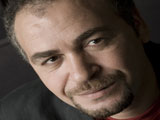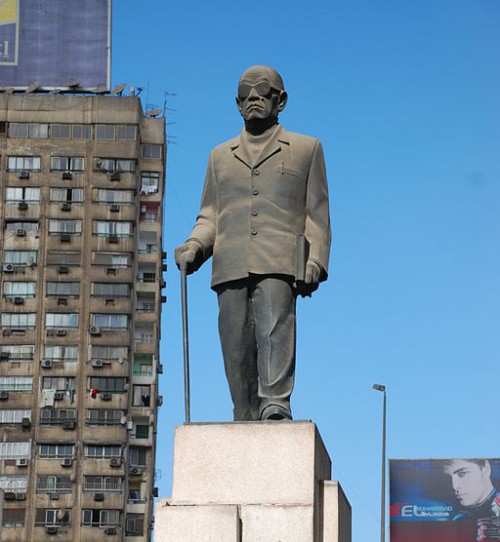My Grandfather: Naguib Mahfouz
by Hamdy El-Gazzar / September 24, 2012 / 2 Comments
Egypt’s Nobel Prize Winner and the New Egypt
Naguib Mahfouz, my adopted grandfather, was a kind citizen who always smiled as he walked around the city. He did not like cars and did not own one throughout his long life, which would have reached 100 years this December.
While he was alive, on a morning like any other, Mahfouz leaves his ground floor flat on Nile Street, in the district of Agouza, Cairo, carrying an envelope filled with papers. He walks for 100 meters then crosses over the Nile, first by the Galaa bridge, then by the Qasr el Nil bridge. He cuts through Tahrir Square and smiles at it, full of pride. Then he sits down in Café Ali Baba to read the morning papers that he purchased from the large young man at the beginning of Talaat Harb Street. He starts to read the paper, sipping his coffee slowly, and then his face turns sour.

- “From Egypt” attempts to draw a cultural map of Egypt and the Arab
world by profiling the artistic, literary, and political issues that affect
the region via on-the-ground coverage of current events, publications, and
the fight for freedom of expression. 
- Hamdy El-Gazzar is an Egyptian writer and one of the
39 young Arab writers included in the Beirut 39 Project. His first novel,
Sihr Aswad (Dar Merit, 2005) won the prestigious Sawaris Award,
and was subsequently translated by Humphrey Davies (Black Magic,
AUC Press, 2007). His second novel, Ladhdhat Sirriyya (Secret
Pleasures) was published by Dar al-Dar in 2008. He is currently working on
a third novel.
A few moments later, he leaves his newspapers and the uncanny news and goes to the balcony to glance over at the square beneath him. He reminds himself that he must write something, but he will not write here and now, no. He will leave it until the time comes, in his study, during those hours dedicated solely to writing.
My grandfather was as punctual as a clock. He was meticulous and hard on himself and life.
My grandfather was not just one writer. He is many writers: Novelists, short story writers, screenwriters, at least one playwright, and a poet.
In his early youth, he was mesmerized by philosophy and was going to go to Europe on a scholarship for his postgraduate studies, but “the stars did not align.” Because of his name, the university administration suspected that he was a Christian, and his scholarship request was rejected.
My grandfather had a rich sense of humor and laughed when he remembered this unjust event.
Instead he started his literary career by falling in love with Ancient Egypt. He wanted to dedicate his life to writing about Pharaonic Egypt, but he only completed three books on the subject before his heart drifted towards Fatimi Egypt, a time that influenced his birth and early childhood. So he wrote many novels: Khan el Khalili, Midaq Alley, the Nobel Prize-winning Cairo Trilogy, and many more. Then he longed once more for philosophy, so he crafted The Search and Children of Our Alley. Out of his love for a family from the Egyptian urban rabble, otherwise known as the “Harafish,” he wrote the series The Harafish. As he approached a wise old age he began reciting poetry and titled his pieces Echoes of an Autobiography and Dreams of the Rehabilitation Period. You might ask, rehabilitation from what?
From a stab wound on his neck that the old man was subjected to at the age of eighty-three because of the dark souls and even darker minds that pump poison into the minds of the public, some of whom are kindhearted and naïve, while others are merely ignorant. My grandfather almost lost his life at the hands of an ignorant man who had not read even one line of Mahfouz’s writing.
My grandfather survived the attack with a weakened, shaking right arm and an emotional scar, but his other hand kept writing.
Will my grandfather be subjected to murder once again, even after his death, because of the spreading religious tirades in Egypt? My grandfather sends you his blessings from the heavens today and says:
“Egypt without creativity and art and literary writing is not Egypt, my grandchildren. I left behind for you novels that are the poetry of modern life and an ode to you and to humanity. So be kind and forgiving, loving to creativity and art, late nights out, and good company. May God bless your mornings.”
Translation: Nour Abdelghani






2 Comments on "My Grandfather: Naguib Mahfouz"
Thank you for sharing this personal view of Naguib Mahfouz. I most recently read his short story Zaabalawi. The character’s search for Zaabalawi was so inspiring and offered a sense of hope, even in today’s world.
Thank you Hamdy for this beautiful story! The expressiveness of your text gives the impression that truly Naguib was your grandfather.
One question: Ali Baba Cafe really exist?
Thanks and see you soon I hope.
All the best!
Rafael